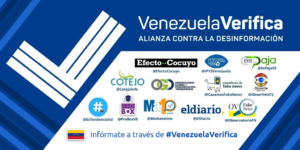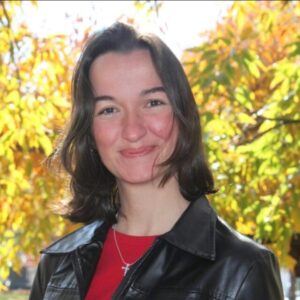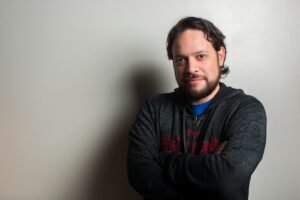In a hostile environment for the press, with arbitrary detentions, censorship and government repression, fact-checking organizations in Venezuela decided to unite in a collaborative effort to verify data and combat disinformation in the face of the Dec. 6 legislative elections.
The alliance, called Venezuela Verifica, brings together fact-checkers from seven organizations, under the coordination of the Venezuelan Press and Society Institute (IPYS Venezuela). The initiative, announced at a series of online events in the last week of October, is inspired by similar projects that took place in Colombia, Argentina, Brazil and Mexico.
The following media are participating in the alliance: Cocuyo Chequea (Efectococuyo.com), ObserVe (Ininco-Universidad Central de Venezuela), CotejoInfo y Observatorio de Fake News (Medianálisis.org), Cazadores de Fake News, EsPaja (Transparencia Venezuela) and Chequéalo (ElDiario.com). The Global Observatory for Communication and Democracy, Probox and EsTendenciaVzla also support the initiative.

Listed are the media outlets that are part of Venezuela Verifica
At first, the group will publish the checks on the websites and social networks of the member organizations, but there are plans to create a site for the alliance, which will serve as a repository for all the content produced. Also in this first stage, the objective is to expand the audience of the checks, which will be done individually by the organizations.
Eugenio Martínez, coordinator of Cocuyo Chequea, the fact-checking unit of the Venezuelan site Efecto Cocuyo, said that the union of media is fundamental to combat disinformation. According to him, false information reaches a larger audience, faster and with greater impact than the checks, because it reinforces people's beliefs. “Disinformation is sexy and verification is unfriendly,” Martínez concluded in an interview with LatAm Journalism Review (LJR).
In this context, increasing the audience for checks is crucial. “In a country where both economic and labor resources are limited, it is not the same for all the projects to separately try to verify the same issue as if simply one of the partners verifies one issue and all the others verify others. This collaboration [...] is ideal to be able to maximize efforts and the use of financial and technological resources,” he said.
If in this first stage the focus is to expand the dissemination of content, in the second stage, the media intend to work on joint verifications, said journalist Marianela Palacios Ramsbott, from IPYS Venezuela, coordinator and cofounder of the alliance.
Before moving on to the second stage, the group needs to solve an initial challenge, which is to standardize the verification parameters. Thus, the alliance has to adjust and adapt the different fact-checking methodologies, as well as the tags that each organization uses to classify the content as true, false, etc.
“For the moment, each one is going to maintain their ways of doing things. We are also thinking about the possibility that later on we will do joint verifications, especially when greater depth and national scope are needed. As we have representatives in various states of the country, this breadth of representation in the national territory is one of the strengths of working in an alliance,” Palacios told LJR.

A jornalista Marianela Palacios. Foto: Arquivo pessoal
The initiative will start publishing its first articles in November, but the goal is that it can continue in 2021. “We are seeing how we can walk together, so that this first event serves to warm up, as a test, what we can do in other scenarios that arise,” Víctor Amaya, director of Venezuelan fact-checking organization EsPaja.com and cofounder of Venezuela Verifica, told LJR.
Amaya explained that the choice to launch a cooperative focused on the electoral period, which may seem obvious in other countries, is not so simple in Venezuela today. “We can or can’t qualify them as elections, because that is one of the great political discussions in Venezuela, who recognizes or does not recognize this election. But regardless of that, there is an electoral campaign that will lead to this event. And we have our sights set on that event,” he said.
Martínez, of Cocuyo Chequea, points out that this election will be "very particular,” because, among other reasons, the opposition refused to participate, arguing that the process will be rigged to benefit the Socialist Party, which governs the country. In addition, the European Union had requested that the election be postponed, as a condition of sending a mission to monitor the vote, but the request was denied by the government of Nicolás Maduro.
“The process of Dec. 6 in Venezuela is very particular, [...] dismissed by a good part of the western international community, by the main democracies in the region and in Europe,” Martínez said. Another unusual issue in the election is that the opposition called for a popular consultation between Dec. 5 and 12, so that citizens can say whether or not they agree with the parliamentary elections. And the alliance intends to maintain the verification effort during that consultation.
“The project is not designed only for the parliamentarians of Dec. 6, but it has to go much further, because there are two events that are practically competing with each other, to put it that way, in terms of the little information that is being offered about how they are organized, where citizens end up sadly confused,” Martínez said.
In this scenario, the type of verification carried out by fact-checking organizations will also be different from the checks in a normal election, Martínez explained. Rather than debunking rumors about voting methods, for example, he believes the checkers' focus will be on popular participation in the election. In other words, the collaborative effort will serve less to guide voters on how to vote and on candidates, as it could happen in elections in other countries, and more to clarify the consequences of elections for the country, Martínez said.
There is yet another component that makes this collaborative effort different: the difficulty of accessing public information in Venezuela. According to Palacios, the government does not regularly disclose basic macroeconomic data, for example. There is a lack of transparency and accountability culture among authorities.
“Actually the limitation of public data here in Venezuela is one of the worst in Latin America. In a country with so little official public information available, with sites completely deactivated, without having primary statistical information, which is normal in any other country in the world, [...] it further complicates the work of fact-checking. But still many journalists, very good journalists, are doing their jobs,” she said.
For Martinez, the lack of reliable information means that each fact-checking organization, before starting its checks, has to develop its own database, with its own methodology to monitor topics such as hyperinflation, for example. “We have some initial requirements that probably other projects in other parts of the world do not have,” he said.
Amaya highlights other challenges that arise with the lack of public data. One is that it is very rare to have documents or links that can be inserted and used in the stories – something extremely important for many fact-checking methodologies, which seek to publish all the information used in the verification, so that the reader can himself redo and check the story.
“Many times the official data we have is simply through a statement, but not by an official report that one can check, read in full, or download. Many times the verification factors end up being statements of different government actors that end up contradicting each other, even when it is the same person [who contradicts himself], that has also happened,” Amaya said.
The absence of public data also forces checkers to seek alternative sources, mainly international bodies, such as UN agencies or OPEC (Organization of the Petroleum Exporting Countries). According to Amaya, these organizations receive information from the Venezuelan government that is not disclosed within the country, but that is used for checks.
Another difficulty, according to the journalist, is getting the sources to keep their statements "on-the-record,” because the fear of appearing in a story is very great. And this, for fact-checking organizations, is fundamental, because many have as a rule not to work with anonymity and off-the-record information. “Even if we have the information, we need everyone to be identified, and sometimes that is a difficult factor to close a job,” Amaya said.
With all these barriers to accessing information, the alliance's work becomes even more important, Amaya said. He points out that, in the country, the media ecosystem has been affected, and press freedom has deteriorated, with the closures of 65 newspapers in recent years.

O jornalista Victor Amaya. Foto: Fabiola Ferrero
“There are Venezuelan states where there is no written press. Opinion, interview and news programs have disappeared, both on radio and television, except for spaces that are basically affiliated with the public media system and therefore controlled by power with the official narrative. Therefore, media that are subject to the propaganda policies of the ruling party, where we have also detected a lot of disinformation action from the central power,” Amaya said.
He pointed out that the extinction of many traditional newspapers in Venezuela was accompanied by the emergence of new digital media, but that it is difficult for these online outlets to reach the public. “We have some of the lowest internet speeds on the continent. And in addition, many connection capabilities have been lost. In recent years, up to 7 million cell lines have been lost, which were in Venezuela compared to a decade ago. In any case, keeping people informed is a challenge, it is not as easy as it can be elsewhere: 'well, I go to the press and read.’ What if you can't find any press to read?” he asked.
In this media ecosystem that is increasingly restricted to media aligned with the government and within a polarized society, fact-checking organizations help "pull citizens out of a bubble," Martínez said. For him, many people are informed through social networks in the country, which is dangerous, because they receive only a limited view of reality. “Unfortunately, Venezuela no longer has media that generate public opinion, but rather has sectors that feed into each other through social networks.”
All of this makes the country fertile ground for the spread of false news, especially in the electoral period, Palacios said. "Basically the objective of the disinformants, especially when they have a power that tends towards totalitarianism and almost hegemonic control of the media, is to politically deactivate the adversary. And that is why it is so important that alliances, such as Venezuela Verifica, enter the game to somehow act as a counterweight to that sea of falsehoods that circulates daily.”
Palacios added that the project is seeking funding for 2021 and that organizations interested in joining or supporting the alliance can contact them by emailing venezuelaverifica@gmail.com.
This story was originally written in Portuguese and was translated by Teresa Mioli.